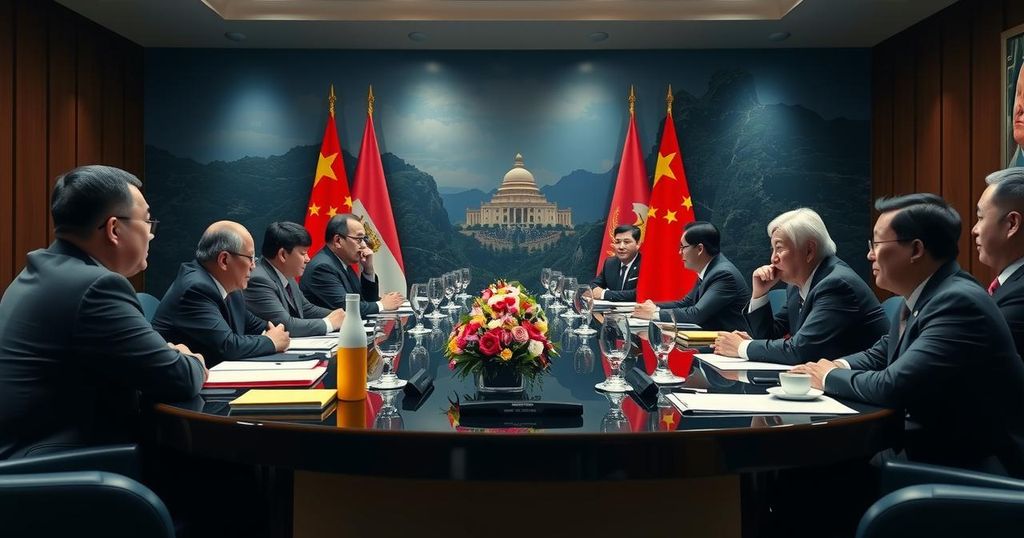At the recent APEC summit, President Biden’s lesser role was overshadowed by Chinese President Xi Jinping, who asserted China’s growing influence in Latin America through cultural and economic ties. Xi’s strategic investments in the region, coupled with diplomatic initiatives, have positioned China favorably, while Biden’s involvement appeared secondary. The dynamics represent significant challenges for U.S. foreign policy amidst concerns over democratic backsliding in partner nations.
During the recent Asia-Pacific Economic Cooperation (APEC) Forum, President Joe Biden found himself overshadowed by Chinese President Xi Jinping, who occupied a central position during a prominent photo opportunity. This disparity highlighted Biden’s decreasing influence in a region regarded as vital to American interests. Xi, while promoting China’s deep cultural relationships in Peru, also underscored the growing prominence of Chinese investments and infrastructure projects throughout Latin America. The focus of the summit was unequivocally centered on China, with Biden’s participation feeling secondary to Xi’s initiatives. In his address to Peruvian audiences, Xi praised the profound bonds between Peru and China, emphasizing cultural ties rooted in ancient civilizations. He also announced significant infrastructure investments through China’s Belt and Road Initiative, reflecting a long-term commitment to developing Latin America’s economy. Despite the backdrop of warmth in Xi’s rhetoric, it is evident that China employs pragmatic economic strategies, a counter to the perceived inaction from the United States. The significance of Xi’s visit, alongside a subsequent diplomatic tour across Latin America, signals a renewed focus on strengthening economic partnerships, particularly in sectors crucial to China’s resource demands, such as metal ores and agricultural commodities. U.S. officials express concern over potential military and intelligence implications stemming from China’s presence in the region, while the soon-to-be Biden administration grapples with evolving geopolitical narratives. National Security Adviser Jake Sullivan acknowledged that this period presents both challenges and opportunities amidst shifting global power dynamics. Eric Farnsworth, from the Council of the Americas, remarked that most Latin American nations prefer closer ties with the United States, save for a few leftist regimes. He suggested that the Biden administration missed opportunities to cultivate essential economic relations, particularly concerning infrastructure development that positions countries favorably. While domestic challenges plague Peru’s leadership, with widespread corruption scandals putting President Dina Boluarte in a tenuous position, there was a strategic choice for Biden not to publicly align with her during the APEC meeting. This reflects broader concerns regarding the movement towards authoritarianism and the erosion of democratic principles in Peru, which starkly contrasts with China’s opportunity-driven approach to foreign relations, devoid of strict conditionality. The differing approaches to diplomatic engagement exemplify the complexities facing U.S. foreign policy in Latin America as China asserts its influence.
The APEC Forum serves as a significant diplomatic arena where economic cooperation and strategic alliances among Pacific Rim countries are fostered. The 2023 summit highlighted China’s ascending economic diplomacy, notably through the Belt and Road Initiative, contrasting with the United States’ perceived decline in regional influence. The dynamics observed underscore a broader geopolitical competition in which infrastructure investments and cultural ties are leveraged as tools for enhancing soft power in Latin America.
In summary, the APEC summit illuminated the shifting power dynamics in the Asia-Pacific region, showcasing China’s increasing influence over Latin America while highlighting President Biden’s relegated role. Xi Jinping’s strategic investments and diplomatic initiatives position China favorably against the U.S., which confronts challenges regarding its engagement strategies. The complex interplay of economic interests, political relationships, and emerging threats underscores the necessity for a recalibrated U.S. approach as it navigates its place within a changing global landscape.
Original Source: www.telegraph.co.uk






